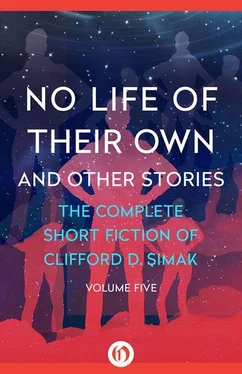“We’ll talk it over later,” said Scott. “After we get a cup of coffee into you. I bet you haven’t had one in weeks.”
“Weeks,” jeered Hugh. “Man, it’s been ten months.”
“Okay, then,” said Scott. “Let’s round up Jimmy. He must be around here somewhere. I don’t like to let him get out of my sight too much.”
The silence of the dreaming red deserts was shattered by a smashing report that drummed with a mighty clap against the sky above. A gush of red flame spouted over the domed top of the mighty building and metal shards hammered spitefully against the sides, setting up a metallic undertone to the ear-shattering explosion.
Sick with dread, Scott plunged to the corner of the building and felt the sick dread deepen.
Where his space ship had lain a mighty hole was blasted in the sand. The ship was gone. No part of it was left. It had been torn into tiny fragments and hurled across the desert. Wisps of smoke crept slowly from the pit in the sand, twisting in the air currents that still swirled from the blast.
Scott knew what had happened. There was no need to guess. Only one thing could have happened. The liquid oxygen had united with the gasoline, making an explosive that was sheer death itself. A single tremor, a thrown stone, a vibration … anything would set it off.
Across the space between himself and the ship came the tattered figure of a man. A man whose clothes were torn. A man covered with blood, weaving, head down, feet dragging.
“Jimmy!” yelled Scott.
He sprinted forward but before he could reach his side, Jimmy had collapsed.
Kneeling beside him, Scott lifted the man’s head.
The eyes rolled open and the lips twitched. Slow, tortured words oozed out.
“I’m sorry … Scott. I don’t know why …”
The eyes closed but opened again, a faint flutter, and more words bubbled from the bloody lips.
“I wonder why I did it!”
Scott looked up and saw his brother standing in front of him.
Hugh nodded. “The Martians again, Scott. They could use Jimmy’s mind. They could get hold of him. That blasted brain of his …”
Scott looked down at the man in his arms. The head had fallen back, the eyes were staring, blood was dripping on the sand.
“Hugh,” he whispered, “Jimmy’s dead.”
Hugh stared across the sand at the little glimmer of white in the shadow of the building.
“We’ll make another cross,” he said.
IV
The Martians hadn’t wanted them to come. That much, at least, was clear. But having gotten here, the Martians had no intention of letting them return to Earth again. They didn’t want them to carry back the word that it was possible to navigate across space to the outer planet.
Maybe the Martians were committed to a policy of isolation. Maybe there was a “Hands Off” sign set up on Mars. Maybe a “No trespassing” sign.
But if that had been the case, why had the Martians answered the radio calls from Earth. Why had they co-operated with Dr. Alexander in working out the code that made communication possible? And why did they continue sending messages and rockets to the Earth? Why didn’t they sever the diplomatic relationship entirely, retire into their isolation?
If they didn’t want Earthmen to come to Mars why hadn’t they trained guns on the two ships as they came down to the scarlet sand, wiped them out without compunction? Why did they resort to the expedient of forcing Earthmen to bring about their own destruction? And why, now that Harry Decker and Jimmy Baldwin were dead, didn’t the Martians wipe out the remaining two of the unwanted race?
Perhaps the Martians were merely efficient, not vindictive. Maybe they realized that the remaining two Earthmen constituted no menace? And maybe, on the other hand, the Martians had no weapons. Perhaps they never had a need for weapons. It might be they had never had to fight for self preservation.
And above and beyond all … what and where were the Martians? In that huge building? Invisible? In caverns beneath the surface? At some point far away?
Maybe … perhaps … why? Speculation and wonderment.
But there was no answer. Not even the slightest hint. Just the building shimmering in the unsetting Sun, the metallic bugs buzzing in the air, the lilies nodding in the breeze that blew across the desert.
Scott Nixon reached the rim of the plateau and lowered the bag of roots from his shoulder, resting and waiting for Hugh to toil up the remaining few yards of the slope.
Before him, slightly over four miles across the plain, loomed the Martian building. Squatting at its base was the battered, pitted space ship. There was too much ozone in the atmosphere here for the steel in the ship to stand up. Before many years had passed it would fall to pieces, would rust away. But that made little difference, for by that time they probably wouldn’t need it. By that time another ship would have arrived or they would be dead.
Scott grinned grimly. A hard way to look at things. But the only way. One had to be realistic here. Hard-headed planning was the only thing that would carry them through. The food supply was short and while they’d probably be able to gather enough for the coming winter, there was always the possibility that the next season would find them short.
But there was hope to cling to. Always hope. Hope that the summer would bring another ship winging out of space … that this time, armed by past experience, they could prevent its destruction.
Hugh came up with Scott, slid the bag of roots to the ground and sat upon it.
He nodded at the building across the desert.
“That’s the nerve center of the whole business,” he declared. “If we could get into it …” His voice trailed away.
“But we can’t,” Scott reminded him. “We’ve tried and we can’t. There are no doors. No openings. Just those little holes the bugs fly in and out of.”
“There’s a door somewhere,” said Hugh. “A hidden door. The bugs use it to bring out machines to do the work when they shoot a rocket out for Earth. I’ve seen the machines. Screwy looking things. Work units pure and simple but so efficient you’d swear they possessed intelligence. I’ve tried to find the door but I never could and the bugs always waited until I wasn’t around before they moved the machines in or out of the building.”
He chuckled, scrubbing his bearded face with a horny hand.
“That rocket business saved my life,” he said. “If the power lead running out of the building to the cradle hadn’t been there I’d been sunk. But there it was, full of good, old electricity. So I just tapped the thing and that gave me plenty of power … power for heat, for electrolysis, for atmospheric condensation.”
Scott sank down heavily on his sack.
“It’s enough to drive a man nuts,” he declared. “We can reach out and touch the building with our hand. Just a few feet away from the explanation of all this screwiness. Inside that building we’d find things we’d be able to use. Machines, tools …”
Hugh hummed under his breath.
“Maybe,” he said, “maybe not. Maybe we couldn’t recognize the machines, fathom the tools. Mechanical and technical development here probably wasn’t any more parallel to ours than intelligence development.”
“There’s the rocket cradle,” retorted Scott. “Same principle as we use on Earth. And they must have a radio in there. And a telescope. We’d be able to figure them out. Might even be able to send Doc Alexander a message.”
“Yeah,” agreed Hugh, “I thought of that, too. But we can’t get in the building and that settles it.”
“The bugs get under my skin,” Scott complained. “Always buzzing around. Always busy. But busy at what? Like a bunch of hornets.”
Читать дальше












